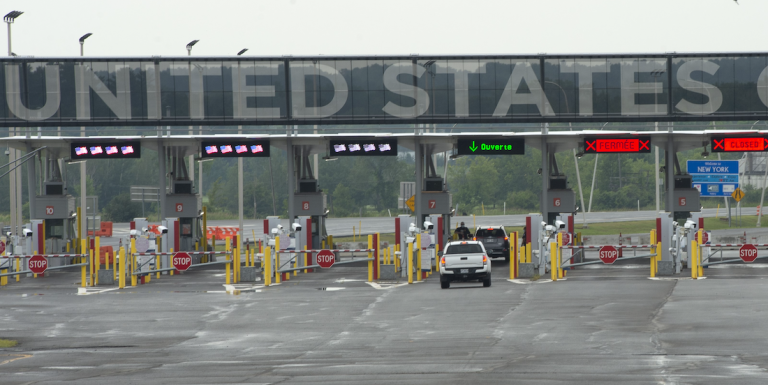
New Canadian travel advisory highlights U.S. border agents’ broad powers to inspect phones, laptops, and other devices
New York, N.Y. – The Canadian government has updated its official travel advice, cautioning citizens that U.S. border officers have significant authority to search electronic devices-including phones, laptops, and tablets-when entering the United States.
The advisory, updated in April 2025, urges Canadians to expect increased scrutiny at U.S. ports of entry, including demands for device passwords and the possibility of invasive checks.
Canada updates guidance amid rising border tensions

This move reflects growing concerns over privacy and legal rights as U.S. authorities intensify enforcement of border protocols.
The update follows reports of travelers being detained or denied entry based on information found on their devices, such as social media posts or private messages critical of U.S. policies.
U.S. border search powers explained
U.S. Customs and Border Protection (CBP) officers are authorized to search the electronic devices of any international traveler entering or leaving the United States, including U.S. citizens, permanent residents, and foreign visitors.
These searches can be conducted without a warrant under the “border search exception,” a legal doctrine that allows warrantless searches at international borders or their functional equivalents, such as airports and land crossings.
CBP distinguishes between basic and advanced searches:
- Basic search: Officers review device contents without external equipment.
- Advanced search: Officers use external tools to access, copy, or analyze information, requiring reasonable suspicion and approval from a senior CBP manager.
CBP policy states that only data stored locally on the device can be examined; cloud-based data is not included, as devices are typically put into airplane mode before inspection.
Impact on travelers: What to expect
The Canadian advisory warns that even routine cross-border trips could now involve more than a simple passport check. Travelers may be asked to unlock devices and provide passwords. Refusal to comply can result in device confiscation, delayed travel, or denial of entry-especially for visa holders and foreign visitors. U.S. citizens cannot be denied entry but may have their devices seized for up to 15 days or longer if part of an investigation.
The advisory stresses that the Canadian government cannot intervene if travelers fail to meet U.S. entry or exit requirements. Travelers denied entry could face detention while awaiting deportation. Legal experts recommend Canadians consider traveling with minimal devices or using “burner” phones to reduce the risk of sensitive information being accessed.
Legal and privacy considerations
The Fourth Amendment of the U.S. Constitution protects against unreasonable searches and seizures, but the border search exception grants CBP broad discretion. While there are some limits, courts have yet to fully define the boundaries of these powers. For practical purposes, travelers should assume their devices can be searched with few restrictions.
Travelers do not have to provide passwords, but refusal may lead to device confiscation. If sensitive or privileged information is present, travelers can assert confidentiality, prompting CBP officers to consult legal counsel before proceeding.
Advice for Canadians and other international travelers
Canadian officials and legal advisors recommend several best practices:
- Only bring essential devices and information needed for travel.
- Store sensitive data in the cloud, not on the device.
- Be mindful of social media content and messages that could be misinterpreted by border agents.
- Consider using a secondary “burner” phone for travel purposes.
- Document any incidents at the border, including officer names and details, and contact an immigration lawyer if necessary.
The advisory also notes that U.S. policies may change at any time, and travelers should stay informed about the latest requirements.
Canada Warns Travelers: U.S. Border Officers can Search e-Devices (May 7, 2025)
#CanadaUSBorder #DeviceSearch #TravelAdvisory
TAGS: Canada, U.S., border, electronic devices, privacy, travel advisory,
CBP, customs, immigration, search, legal rights, burner phone,
inspection, detention, deportation, travel tips, international travel

Share Your Thoughts
How do you feel about U.S. border officers
being able to search your electronic devices?
Share your experiences and opinions on this topic.
Social Media
X (Twitter) blurb
Canada warns travelers: U.S. border officers can search electronic devices. Prepare for increased scrutiny at entry. #CanadaUSBorder #DeviceSearch Read more: bit.ly/USbordersearch2025
Bluesky blurb
Canada warns travelers: U.S. border officers can search electronic devices. Expect increased scrutiny at entry. #CanadaUSBorder #DeviceSearch Full story: bit.ly/USbordersearch2025
LinkedIn blurb
Canada’s updated travel advisory warns that U.S. border officers have broad authority to search electronic devices, including phones and laptops. This heightened scrutiny raises significant privacy and legal concerns for international travelers and businesses. Canadians are urged to minimize device use, consider burner phones, and stay informed about evolving U.S. policies. #CanadaUSBorder #DeviceSearch Read the full story: www.stewardshipreport.org/wiki/Canada_US_Border_Electronic_Device_Search
Truth Social blurb
Canada warns travelers: U.S. border officers can search electronic devices. Expect increased scrutiny at entry. #CanadaUSBorder Read more: www.stewardshipreport.org/wiki/Canada_US_Border_Electronic_Device_Search
Mastodon blurb
Canada’s updated travel advisory warns travelers about U.S. border officers’ power to search electronic devices. Expect increased scrutiny and prepare accordingly. Canada warns travelers: U.S. border officers can search electronic devices. #CanadaUSBorder Read more: www.stewardshipreport.org/wiki/Canada_US_Border_Electronic_Device_Search
Instagram blurb
Traveling from Canada to the U.S.? Be prepared: border officers can search your electronic devices. Know your rights and minimize device use.
#CanadaUSBorder #DeviceSearch #TravelTips #Privacy #BorderCrossing
Read more in our bio link.
Facebook blurb
Canada’s latest travel advisory warns that U.S. border officers can search your electronic devices-including phones and laptops-when entering the United States. This increased scrutiny means travelers should be prepared for possible device confiscation or denial of entry. Experts recommend minimizing device use and considering burner phones. How will this affect your next trip?
Canada warns travelers: U.S. border officers can search electronic devices.
#CanadaUSBorder #DeviceSearch
Read the full story: www.stewardshipreport.org/wiki/Canada_US_Border_Electronic_Device_Search
Reddit blurb
Canada warns travelers: U.S. border officers can search electronic devices. How will this affect your travel plans? Have you experienced a device search at the border?
#CanadaUSBorder
Read more: www.stewardshipreport.org/wiki/Canada_US_Border_Electronic_Device_Search